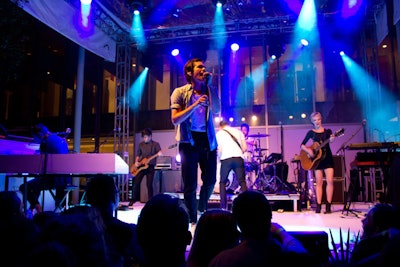
Cassie Brown (@TCGEvents) is the chief experience officer at TCG Events, a full-service event planning company based in Charlotte, North Carolina, that works for nonprofit and corporate including Wells Fargo, Ikea, and Wake Forest Baptist Medical Center.
There’s one major rule that everyone is breaking at events: having a music license. It’s a big mistake, as music licenses are a necessity, and copyrighted music can’t be played publicly (at least not legally) without one.
Copyright laws require music users to get permission from songwriters and composers, who can then charge a fee before their music is played publicly. The majority of artists and music are represented by two main organizations—BMI, the largest music rights organization, and Ascap. It is their job to collect the fees from organizations that use music and to distribute that to the artists. Unless only a few songs are going to be played and the ownership can easily be determined between Ascap and BMI, it is best to get both licenses. Why multiple licenses? Because different licensing organizations own different songs, and it would be a miserable experience to take a band’s set list and look up every song.
Unfortunately, many people don’t understand the law, its scope, and the implications of breaking it. United States copyright law defines “public performance” as any music played outside a group of family and friends. By that definition, all company holiday parties, conferences, grand openings, and other gatherings must obtain a license. Nonprofits aren’t exempt, either. If an entertainer is paid, a music license is necessary. Many companies assume that their music license includes events. Unfortunately, it doesn’t.
What happens if you don’t have a license? By not obtaining one, organizations can be penalized for copyright infringement, risking very large fines—the Ascap fine is a minimum of $750 per song, plus attorney fees and court costs.
Another common misconception is that the contracted band or DJ is responsible for obtaining the license. Many bands and DJs have a line in their contracts stating it is the responsibility of the event's host organization. In addition, the entertainers couldn’t get the license even if they wanted to; the license must be held in the organization’s name. Venue contracts also typically pass off the responsibility of getting a music license to the client.
Once you come to an understanding that you do, in fact, need to get a license, the good news is they are fairly easy to obtain. Each organization’s website offers the ability to download the appropriate license. Fees are based on the number of people at the event, and each license covers all events for one year. (Event hosts fill out a reporting document at the end of the year that provides BMI or Ascap with a total count of all participants across all events.)
One last caution: these licenses don't cover sync rights, video usage, and dramatic rights. That is a separate form (and expense) for each of these.
Forewarned is forearmed: get the licenses you need, avoid future headaches, and stand back as attendees dance the night away.



















